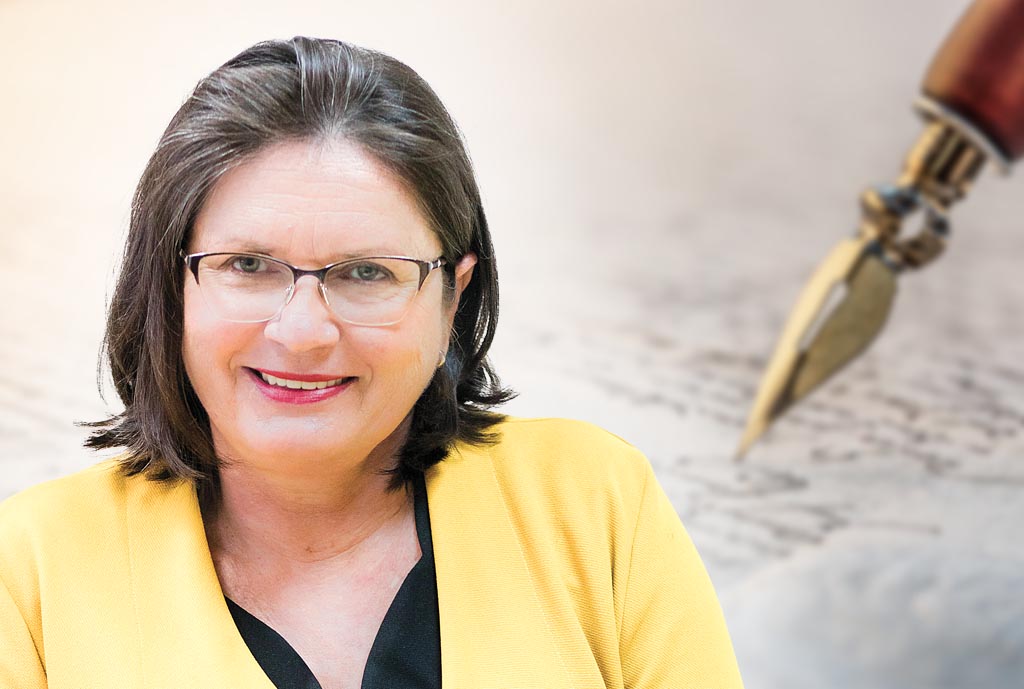By: Dr Andreja Valič Zver
A few days ago, the Norwegian Nobel Committee announced this year’s Nobel Peace Prize laureate, Iranian Narges Mohammadi. In this context, let’s briefly remember why we even have “Swedish” and “Norwegian” Nobel Committees. Over a hundred years ago, the committee was initially unified, just like the unified Swedish-Norwegian union. However, after a brief war in 1905, the Scandinavian countries separated fairly amicably, becoming close allies and peaceful neighbours.
But back to this year’s Nobel Peace Prize laureate. She almost certainly will not be present at the December awards ceremony in Oslo. Instead, she spends her days in the infamous Iranian women’s prison due to the brutal Iranian regime. The Iranian regime, because of her uncompromising and courageous advocacy for human rights, particularly the rights of Iranian women, has sentenced her to several years in prison. None of us can truly imagine the horrific conditions in the prison where women are not treated as human beings, experience daily violence of all kinds, and have their human dignity trampled upon.
Regarding all the forms of violence that the Iranian regime perpetrates against its citizens, the leader of the National Council of Resistance of Iran (NCRI), Maryam Rajavi, could shed light on many of them. She was born in Tehran in 1953 during the reign of the Iranian Shah Pahlavi. Her family suffered greatly from the violence of the Iranian secret police and other repressive entities. Her two sisters were killed, one of whom was pregnant at the time of her arrest and was subsequently tortured and murdered. They also killed her brother-in-law, and her brother, a political prisoner, spent many years in prison. In her student years, Maryam participated in organising public protests against the corrupt regime, and she continued her struggle even after the fundamentalist religious regime led by Khomeini came to power. In addition to organising demonstrations, she ran as a candidate in the 1980 elections, where none of the opposition candidates made it into the Iranian parliament. The regime extensively manipulated and falsified the elections to strengthen its rule.
Since 1984, Maryam has led a resistance organisation that, together with others within the NCRI, works to overthrow the Iranian regime and establish a democratic and secular republic. Their goals include ending the application of Sharia law, establishing an autonomous judiciary, promoting the equality of ethnic and religious communities, ensuring gender equality, safeguarding human rights, implementing a modern market economy, refraining from using nuclear weapons, and pursuing a policy of peaceful coexistence in international relations. Since Maryam was elected the leader of the democratic anti-regime movement in 1993, women have gained prominence and leadership roles in it. Maryam consistently encourages women’s participation in politics and believes that oppressed Iranian women are crucial and proactive agents of the anti-regime resistance.
Earlier this week, I met with President Maryam Rajavi, who is full of energy and determined to implement her movement’s ten-point plan. This programme has received the support of over a hundred former and current heads of states or governments, providing the NCRI with broad international legitimacy for its peaceful efforts to achieve freedom and democracy in Iran.
Many of us remember Mahsa Amini, who was beaten to death by the Iranian moral police just a year ago because she wanted to enjoy some normalcy in the context of the authoritarian theocracy. The death of this innocent young woman in Iran sparked mass protests, but they were brutally suppressed. Many young people paid with their lives in their just struggle for democratic rights.
In early November, Iran will be admitted to the presidency of the United Nations in New York. This is a slap in the face for all democratic forces fighting for a better and safer future for Iran, the Middle East, and the world. Since some international actors have absolved the Iranian regime of its sins, unfreezing its assets (most recently, President Biden released six billion dollars a few days ago), its ambitions have grown, and it has become the primary destabiliser in the region and beyond. Iranian drones are taking the lives of Ukrainians, and their proxies through Hamas are targeting innocent civilians in Israel, to name just a few prominent activities of the Iranian regime, led by the dedicated Iranian Revolutionary Guard. They possess weapons capable of reaching many European capitals. What should the Iranian authorities still do to be properly labelled?
Let us hope that awarding the Nobel Peace Prize to Iranian activist Narges Mohammadi will send a strong message to the global community, helping to make brave Iranian women and men more visible and heard.
